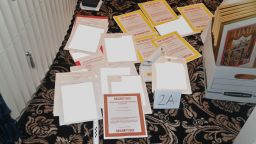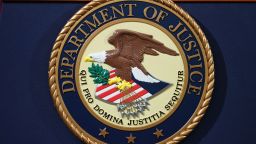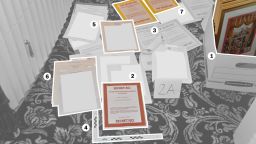Former President Donald Trump has pushed an “incomplete and inaccurate narrative” in his recent court filings about the Mar-a-Lago search, the Justice Department said in a historic court filing late Tuesday night.
Prosecutors fleshed out new details about the ongoing criminal investigation into Trump’s potential mishandling of classified documents, which he took from the White House to his resort and home in Florida. Trump and his allies have denied any wrongdoing.
In total, the US government has recovered more than 320 classified documents from Mar-a-Lago since January, including more than 100 seized in the August search, DOJ says.
The filing is in response to Trump’s bid for a “special master” in a civil lawsuit against the Justice Department, weeks after the FBI searched Mar-a-Lago. The judge handling the case, a Trump appointee, has said her “preliminary intent” is to bring in a special master. A hearing is scheduled for Thursday.
Here are some key takeaways from the filing, what we learned and where we go from here.
Docs were moved and possibly hidden from investigators
Documents were “likely concealed and removed” from a storage room at Mar-a-Lago as part of an effort to “obstruct” the FBI’s investigation, the Justice Department said in its filing Tuesday.
What’s more, the DOJ said that the search “cast serious doubt” on his lawyers’ claims that there had been a “diligent search” to return classified material in response to a grand jury subpoena.
A Trump lawyer signed a statement to the Justice Department in June attesting that all of the classified material at Mar-a-Lago had been returned.
“That the FBI, in a matter of hours, recovered twice as many documents with classification markings as the ‘diligent search’ that the former President’s counsel and other representatives had weeks to perform calls into serious question the representations made in the June 3 certification and casts doubt on the extent of cooperation in this matter,” DOJ wrote.
The Justice Department filing gave federal investigators the chance to rebut – on the record – many of the claims that Trump, his lawyers and his political allies have been making as they’ve harshly attacked the FBI’s unprecedented search of his residence.
DOJ rejects Trump criticisms and falsehoods about FBI search
DOJ wrote that the filing included a “detailed recitation of the relevant facts, many of which are provided to correct the incomplete and inaccurate narrative set forth in Plaintiff’s filings.”
The filing cited numerous examples refuting claims that have come from Trump’s team about the search and what happened in the lead-up to it.
For instance, a top DOJ official contends that federal investigators were limited in what they could look through when visiting the Mar-a-Lago resort in June – contrary to the Trump team’s narrative of total cooperation.
Trump lawyers didn’t claim docs were declassified
DOJ’s account also undermined claims by Trump and his allies that the former President had declassified the materials in question.
“When producing the documents, neither counsel nor the custodian asserted that the former President had declassified the documents or asserted any claim of executive privilege,” the filing said.
“Instead, counsel handled them in a manner that suggested counsel believed that the documents were classified: the production included a single Redweld envelope, double-wrapped in tape, containing the document,” prosecutors added.
A picture is worth a thousand words
The final page of the 54-page court filing was a photo showing classified document cover sheets arrayed on the floor of Trump’s office at Mar-a-Lago, including documents with highly sensitive material like human sources.
The photo drove home the message that the Justice Department appeared to be making Tuesday laying out its most robust defense yet of the search.
The government took custody of documents from Mar-a-Lago three times this year: Trump voluntarily turned over 15 boxes to the National Archives in January, Trump’s team turned over some materials under subpoena in June, and FBI agents seized another 33 boxes during the search of Mar-a-Lago earlier this month.
Prosecutors said that FBI agents recovered over 100 unique classified documents during the search of Mar-a-Lago on August 8. (Investigators didn’t disclose how many of these were “top secret.”)
About the passport
Trump has attacked the FBI for taking his passports, though they were later returned, claiming they were outside the scope of the warrant and improperly seized.
But the government asserted that the passports were found in a desk draw that contained classified documents, with government records “comingled with other documents.”
“The location of the passports is relevant evidence in an investigation of unauthorized retention and mishandling of national defense information; nonetheless, the government decided to return those passports in its discretion,” DOJ wrote.
A special master would impede review of national security risks, DOJ says
The Justice Department argued in its court filing Tuesday that appointing a special master to review the materials taken from Trump’s residence would harm national security, arguing it would delay the intelligence community’s ongoing review of documents that were kept at Mar-a-Lago.
“Appointment of a special master would impede the government’s ongoing criminal investigation and – if the special master were tasked with reviewing classified documents – would impede the Intelligence Community from conducting its ongoing review of the national security risk that improper storage of these highly sensitive materials may have caused and from identifying measures to rectify or mitigate any damage that improper storage caused,” Justice Department lawyers wrote.
The department highlighted those risks as it argued that the special master would be “unnecessary,” given that the DOJ’s internal filter team had already finished its work segregating potentially privileged documents from the seized materials for privileged documents, and “the government’s investigative team has already reviewed all of the remaining materials, including any that are potentially subject to claims of executive privilege.”
“Furthermore, appointment of a special master would impede the government’s ongoing criminal investigation,” DOJ argued.
DOJ’s filing sets the stage for Trump’s reply and Thursday’s hearing
With the revelations from the new filing, the clock is ticking for Trump to reply in another court submission due Wednesday and then in court Thursday afternoon.
The deadline for Trump to file a written response to the department’s brief is 8 p.m. ET Wednesday.
Then on Thursday, both sides will argue before US District Judge Aileen Cannon, a Trump appointee, in the federal courthouse in West Palm Beach. On Saturday, Cannon signaled she was inclined to grant Trump’s request for a special master in the order she handed down Saturday laying out the briefing schedule. But she said that she had not yet made a final determination on the matter.





Comments